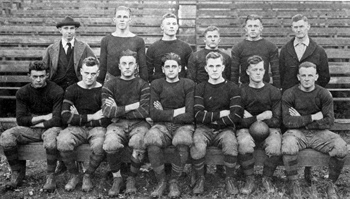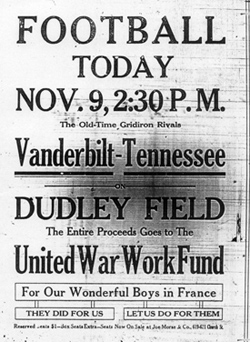Nov. 18, 2009
 View Commodore History Corner Archive
View Commodore History Corner Archive
The date was Nov. 9, 1918. One great conflict had just been resolved and another one began.
The day before, Germany agreed to the surrender terms dictated by President Woodrow Wilson to end World War I (the Armistice became effective on November 11). But the conflict, which began that day, continues 91 years later.
The Conflict: Did Vanderbilt play Tennessee in a football game in 1918? The Commodores say “yea” and the Vols say “nay”…well, sort of.
According to the 2009 media guides from both universities, Vandy claims to have one additional win (28-70-5) over who shows one less defeat with the Commodores (70-27-5). Tennessee doesn’t include the game as official. The discrepancy is a game that was played in 1918.
The Vols media guide notes that during the World War I years of 1917 and 1918, the Tennessee Athletic Council officially suspended varsity football. This was necessary since Vols’ Coach John Bender was enlisted in the military as an instructor in South Carolina and the majority of his players were called into military service.
During this-two year period without varsity football, two unofficial teams were formed from Army recruits and students. One of these unofficial teams representing the University of Tennessee was the Student Army Training Corps, which came to play in Nashville in 1918.
From 1892, the year the rivalry began, through 1916, Vanderbilt held a 12-2-1 advantage over “that school from the East.”
There certainly was a game played that autumn afternoon on Vanderbilt’s original Dudley Field. According to the Nashville Tennessean and the Nashville American, the game was to benefit the United War Work Fund. Reserved seats were $1.00.
The rivalry was just as emotional in those days as the newspaper gave this account:
“When the Tennessee clan comes down from the eastern mountains and comes to Dudley Field around 2:30 o’clock today, the Commodores will have quite a little argument to settle with them. It dates back to the fall of 1916, when the Vol eleven surprised Vandy with a 10-6 defeat and then crawled into their hole for two years gloating over their accomplishment. Yes, the Black and Gold must be vindicated today.”
Vanderbilt did win the gridiron contest by a whopping 74-0 rout (both media guides report 76-0) and the Vols were always referred to as the University of Tennessee and not Student Army Training Corps. The Commodores coach, Dan McGugin was on leave for Army duty leaving future Vanderbilt head coach Ray Morrison as the interim head coach.
Sports writer Cicero Slack of the Tennessean wrote:
 “Crumbling the University of Tennessee eleven like to a page of tissue in the mailed fist of a giant, the Commodores yesterday out on Dudley Field walked over their prostrate foe to a 74-0 victory and gained sweet revenge for the 1916 defeat.”
“Crumbling the University of Tennessee eleven like to a page of tissue in the mailed fist of a giant, the Commodores yesterday out on Dudley Field walked over their prostrate foe to a 74-0 victory and gained sweet revenge for the 1916 defeat.”
In order to be fair the Journal and Tribune in Knoxville reported before the game:
“It is expected that the Orange and White players will give a good account of themselves in the game today, when the S.A.T.C. eleven goes against Vanderbilt, at Nashville.”
This is a clear reference to the football team representing UT as the Student Army Training Corps.
The Journal and Tribune reported on the game’s results:
“Against the University of Tennessee weak resistance, the Vanderbilt football eleven today ran rampant and piled up a score of 74-0. Berryhill, the sensational Vanderbilt back, had one of the greatest days of his football career accounting for six of the eleven’s dozen touchdowns against the Knoxville clan.”
Vanderbilt’s Grailey Berryhill’s six touchdowns are not in the Vanderbilt record book probably because this would not be considered the modern era. Frank Mordica’s five touchdowns in 1978 are listed as the Vanderbilt record for most touchdowns in a single game.
An authority on Vanderbilt football history would be the late Nashville Banner sportswriter Fred Russell. In Russell’s book Fifty Years of Vanderbilt Football published in 1938, he writes about the 1918 Vanderbilt/Tennessee football game:
“Salient after salient was wiped out by Gen. Morrison’s forces and Tennessee’s reinforcements could not check the tide. The retreat turned into a bloody, hopeless rout. Berryhill was cited for bravery for his wonderful outflanking the enemy, by which he took six positions (touchdowns) single-handedly. The result was 76-0.”
Russell doesn’t mention any conflicts and records the game in his book as a victory for the Commodores.
Unlike Vanderbilt, none of the Volunteer players from that season appear on their all-time roster. The Tennessee football media guide does not name an interim coach for the Vols. The name of the second Vols’ football that represented the university in 1918 was named the “Fighting Mechanics.” Their results are not listed.
The week before the Vanderbilt game this “phantom” Tennessee team opened the season with a loss to Sewanee by a similar score of 68-0. This Tennessee squad finished the season at 3-2 with wins over Maryville (9-7), Milligan (32-0) and Tennessee Military Institute (46-0).
If you are a Vanderbilt fan you might argue that it should be official, but if you wear the Orange you will probably disagree.
I report, you decide.
Traughber’s Tidbit: John Tigert played football at Vanderbilt (1901-03) and was inducted into the College Football Hall of Fame in 1970. The halfback was an All-Southern selection in an era when Walter Camp refused to name players from the South to his prestigious All-American teams. Tigert was All-American material. He became Vanderbilt’s first Rhodes scholar and became an educator. Tigert devised and implemented the athletic grant-in-aid program while serving as President of the University of Florida and U.S. Commissioner of Education.
If you have any comments or suggestions you can contact Bill Traughber via email WLTraughber@aol.com.



